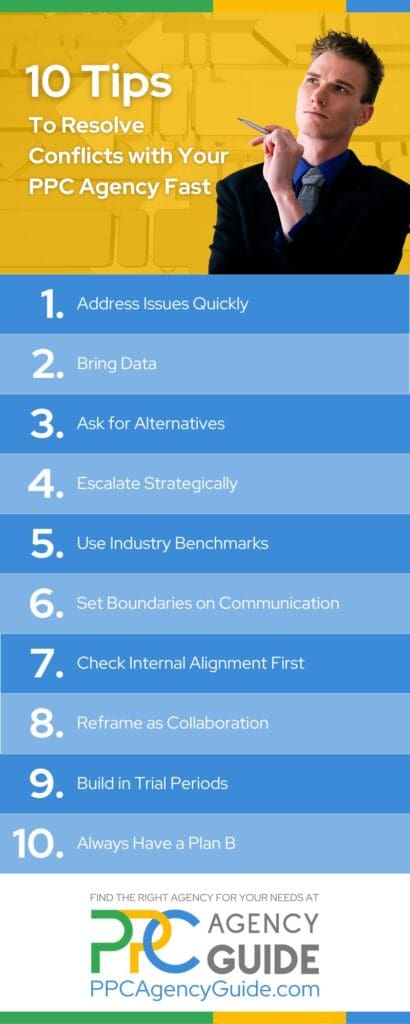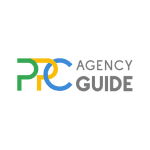
Pay-per-click (PPC) agency disagreements are not necessarily cause for concern. In fact, healthy disagreements can actually lead to better work outcomes and stronger relationships, according to workplace expert Amy Gallo. However, there may come a time when you feel like your disagreement is more than just a bump in the road and isn’t resulting in meaningful change. That’s where PPC agency conflict resolution comes in.
In this guide, we’ll walk you through what you can do to resolve these tougher issues and how to move forward if you don’t see a shift despite your efforts.
Common Sources of PPC Agency Issues and Conflict
While the majority of businesses have good experiences with PPC agencies overall, anytime people are involved, there’s some potential for misunderstandings or conflict. These issues usually start out small and have the potential to be resolved easily, as long as they’re addressed before they have a chance to snowball.
Conflicts in the workplace typically fit into one of three buckets: process, task, or relationship, according to University of Leuven research.
1. Process Conflicts
Process conflicts are related to how the work is carried out, including roles, delegation, timelines, resource use, reporting routines, and other execution logistics.
- Poor Communication: Updates are inconsistent or vague, which prevents you from staying informed and aligned on progress.
- Lack of Transparency: Access, reporting, or decision rationales are limited, making it hard to evaluate work and hold teams accountable.
- Unexpected Costs: Budget changes or added fees appear without clear advance explanation, creating friction around planning and approval.
- Slow Progress: Timelines slip or milestones are missed, so work advances more slowly than the expectations set at the start.
- Blame-Shifting: Responsibility for setbacks is redirected to external factors, which sidesteps how issues will be addressed within the workflow.
2. Task Conflicts
Task conflicts are tied to the content of the work, including goals, decisions, ideas, and the outcomes that define success.
- Unclear Results: Campaign performance is difficult to interpret because the link between advertising spend and business outcomes is not clearly demonstrated.
- Different Priorities: The agency emphasizes one success definition while your business values another, creating a disconnect in focus.
3. Relationship Conflicts
Relationship conflicts are those that don’t have anything to do with the work at hand. They’re often more along the lines of personality clashes or things that come up when people share personal opinions.
- Feeling Ignored: Concerns and input are brushed aside, which erodes confidence in the partnership.
How to Handle Agency-Client Conflict PPC: Step-by-Step Instructions
When conflict comes up with your PPC agency, it can feel uncomfortable, but it does not have to derail the relationship. Taking a clear, step-by-step approach helps you work through issues constructively and gives both sides the best chance at moving forward successfully.
1. Identify the Root Cause
Start by clarifying what the conflict is really about. Refer back to the list above, as this can help change the way you’re viewing the conflict and communicating about it.
2. Gather the Facts
Knowing how to assess PPC agency performance is essential here. Consider areas like communication, budget management, alignment, and innovation. You can also audit your PPC campaigns. Look at reports, performance data, and any notes from past conversations. Having objective information makes it easier to separate frustration from evidence.

3. Start with a Direct Conversation
Bring the concern to your main contact at the agency right away. Addressing issues quickly prevents them from growing and shows you are serious about finding a solution.
4. Reset Expectations
Revisit your goals, budget, and key performance indicators together. This step ensures both sides are working toward the same outcomes.
5. Request a Concrete Action Plan
Ask the agency to outline the exact steps they will take to address the conflict. A clear plan creates accountability and makes progress measurable.
6. Escalate When Necessary
If your account manager cannot resolve the problem, request a conversation with senior leadership. Escalating strategically signals that the issue matters and needs a higher-level response.
7. Document Agreements
Summarize what was decided in writing after each discussion. This prevents misunderstandings and provides a record you can revisit if problems continue.
8. Set Short-Term Checkpoints
Agree on specific timelines to review progress. Shorter intervals keep the resolution process on track and allow for adjustments along the way.

9. Evaluate Results Objectively
Compare outcomes against the action plan and the goals you agreed on. This helps you assess fairly whether the conflict is being resolved.
10. Decide the Future of the Relationship
If the steps lead to progress, continue building the relationship. If they do not, it may be time to move forward with a transition.
10 PPC Agency Conflict Resolution Tips for Business Owners
Even when you know how to deal with a PPC agency in difficult times, working through conflict does not always follow a straight path. Beyond the step-by-step process, there are additional tips you can use in the moment to keep conversations productive and outcomes positive.
1. Address Issues Quickly
Small frustrations can grow into larger problems if they are left unspoken. Raising concerns early gives both sides the best chance to resolve them before they escalate.
2. Bring Data
Emotions can run high during conflict. Grounding the conversation in reports and performance benchmarks helps keep things objective.
3. Ask for Alternatives
If you are not satisfied with one proposed solution, request other options. Having choices makes it easier to find common ground.
4. Escalate Strategically
Sometimes your main contact may not have the authority to make changes. In those cases, ask to involve senior leadership without turning the situation adversarial.
5. Use Industry Benchmarks
Bringing in PPC benchmarks helps create a shared reference point. It shows whether your account is truly underperforming or simply experiencing normal fluctuations.
6. Set Boundaries on Communication
Conflict can be heightened when communication feels inconsistent. Agreeing on timelines for responses and preferred channels helps reduce tension.
7. Check Internal Alignment First
Before you approach the agency, make sure your internal team agrees on priorities. A united front makes conversations clearer and more effective.
8. Reframe as Collaboration
Shifting from “your mistake” to “our challenge” can reduce defensiveness. This small change in tone often makes problem-solving smoother.
9. Build in Trial Periods
Instead of demanding an all-or-nothing change, suggest trying new strategies for a set period. Trial runs lower the risk for both sides and build trust.
10. Always Have a Plan B
Even while working toward resolution, research other agencies quietly and check your contract to see what’s involved in terminating your PPC agreement. Knowing you have alternatives makes you more confident in negotiations.
Signs It’s Time to Change Your PPC Agency
There may come a time when switching PPC agencies is the next logical step. Let’s take a quick look at some signs you might be at that stage.
Repeated Promises without Action
You have heard strategies outlined, but they never seem to get implemented. Consistent delays or excuses are a signal that change may be necessary.
Ongoing Underperformance
Results remain flat despite audits, revised goals, and new plans. When growth stalls for months, it suggests deeper issues in management or strategy.
Constantly Playing Catch-Up
Your agency only reacts after you point out problems, rather than flagging issues proactively. A strong partner should be leading the conversation.
Deep Misalignment
Communication style, industry knowledge, or priorities feel fundamentally different from your own. When alignment is missing, progress becomes harder to achieve.
Eroding Trust
Perhaps the most telling sign is a loss of confidence. If you no longer believe your agency can deliver, the partnership will struggle to recover.
Spend Less Time Managing PPC Agency Relationships and More Time Growing Your Business
At PPC Agency Guide, we understand how draining it can be to have a relationship with your provider plateau or decline. It’s money spent, opportunities lost, and time spent managing something that should be done for you. After connecting with countless businesses across the globe, we’ve seen it firsthand and heard the stories. But we’ve also seen how finding the right partner can completely turn things around.
We specialize in helping businesses find their ideal PPC partners and have built connections across the globe, allowing us to assess your PPC challenges and find the right partner quickly at no cost to your business. If you’ve tried working things out with your current provider and decided it’s time to move on, we can help. Contact us for a complimentary consultation.
FAQs on PPC Agency Conflict Resolution
What should I expect in terms of PPC agency communication?
You should expect consistent updates, timely responses, and reporting that connects your ad spend to real business outcomes. A strong agency sets clear expectations for check-ins and is proactive in bringing new ideas to the table. If communication feels one-sided or vague, it often signals a larger relationship issue.
What are my options if my PPC agency is not performing?
Knowing what to do if a PPC agency is failing can seem overwhelming, but it is manageable. First, address the concern directly with your account manager and request an action plan. If results remain stagnant, escalate the conversation, set short-term checkpoints, and monitor progress closely. Should performance fail to improve after multiple attempts, you may need to explore new agencies that align more closely with your goals.
How do I find a scalable PPC agency?
Look for an agency with a proven track record of managing accounts at different spend levels and across industries. Scalability comes from strong processes, transparent reporting, and the ability to adapt strategies as budgets and goals grow. Ask for case studies that demonstrate growth over time. You can also connect with PPC Agency Guide, and we’ll help you find the right partner.
What can I do if my agency doesn’t maximize PPC performance?
Performance in PPC requires constant vigilance. Request an audit of your campaigns to uncover gaps in targeting, ad copy, or landing pages. Ask your agency for specific recommendations with timelines for improvement. If they cannot provide a credible plan or fail to act on it, consider moving on to an agency with deeper expertise and stronger accountability.


















